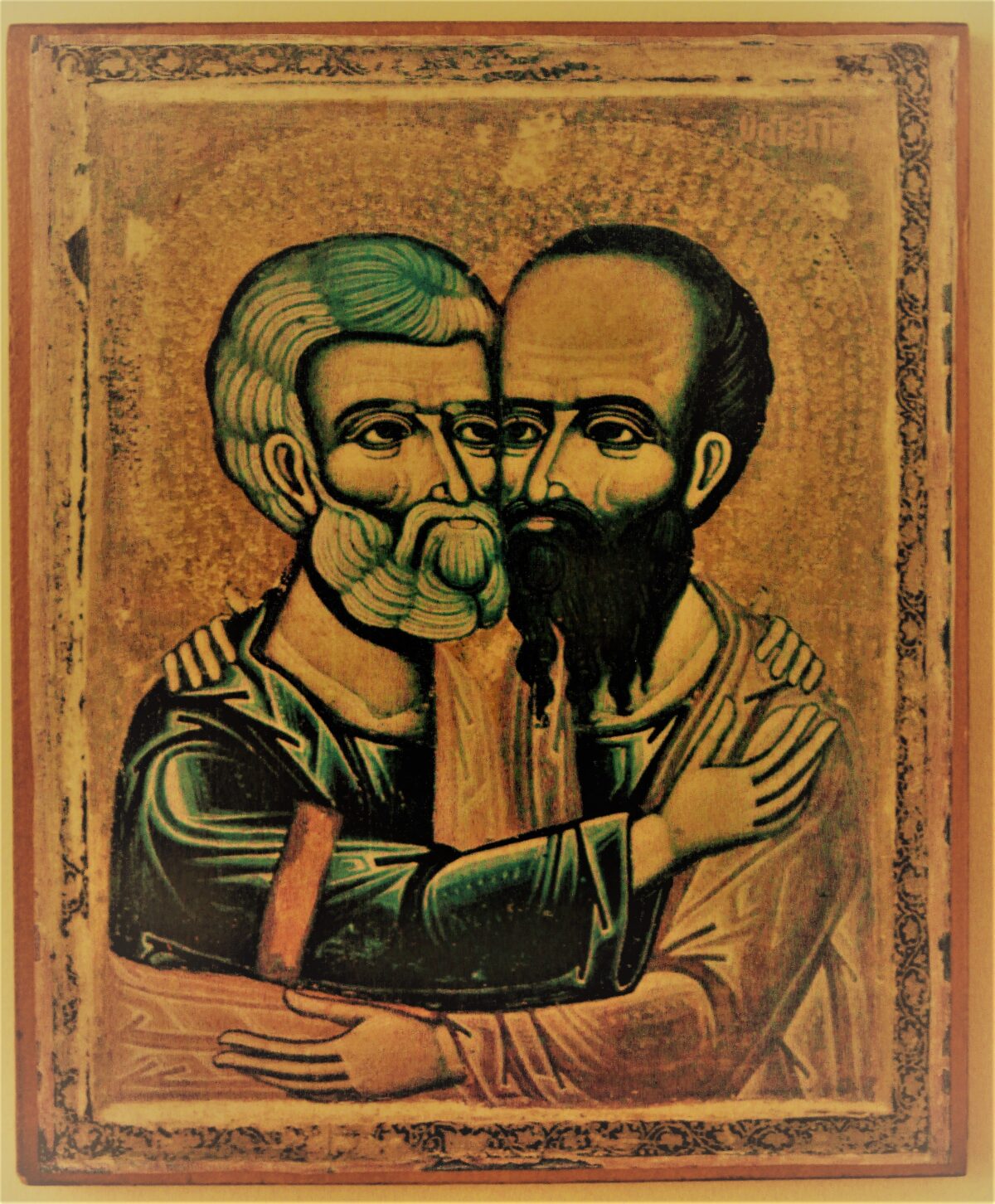By Sr. Wendy Grace, SSJD Novice.

Ezekiel 34:11-16 2 Timothy 4:1-8 John 21:15-19 Psalm 87
As I reviewed the lectionary readings for today I was struck by the theme of sheep and shepherds. Then because actual sheep and shepherds don’t have much to do with most of our lives today I started to think past the metaphor. What are shepherds and sheep anyway? Shepherds lead, guide, direct. Sheep follow. Shepherds lead. Sheep follow.
Today we remember St. Peter and St. Paul and so I would like to look more closely at the lectionary readings and try to understand what they might be telling us both about Peter and Paul as followers and leaders, and about our own responsibilities as followers and leaders.
The reading from Ezekiel 34 is a reaction against the shepherds (the kings) of Israel and the way they have failed in their leadership. Chapter 34 begins with the prophet’s statement that he has been commanded by the LORD to prophesy against the shepherds of Israel. Ezekiel presents God’s charge against them: The shepherds have fed themselves rather than the sheep, they take care of themselves but do not care for the sheep. They ‘have not strengthened the weak, have not healed the sick, have not bound up the injured, have not brought back the strayed or sought out the lost. Instead they have ruled with force and harshness. As a result, the sheep are scattered, they are prey for wild animals and there is no one to search for them as they are scattered all over the earth.
As a result of this failure of leadership the Lord God declares he, God himself, will be the shepherd of the sheep. As shepherd the Lord God will search for the sheep and seek them out, rescue them, gather them from where they have been scattered, feed them, bring back those who are lost, seek out those who have strayed, bind up the injured and strengthen the weak. A good shepherd of the sheep puts the sheep first.
In the epistle reading we consider Paul as both leader and follower. After his dramatic conversion on the road to Damascus Paul began to follow Jesus. He was fearless in proclaiming Jesus as the Son of God and became a leader in the early church. Now, some time later, Paul is looking ahead to his death and reflecting on the cost of following. He takes care to continue to shepherd others through his letters offering guidance, encouragement and promises of continued prayer. Paul’s following has cost him. He is being poured out as a libation (a drink offering). In stirring language Paul states he has fought the good fight, finished the race and kept the faith. Paul is aware that his death, his time of departure, is near.
After Paul’s conversion, when he was still blind, God commanded a disciple called Ananias to go to Paul to heal his blindness. Ananias understandably hesitated. God wants Ananias to go the person who is described as breathing “threats and murder against the disciples of the LORD.” The Lord explains to Ananias that he has chosen Paul to go to the Gentiles. Then the Lord continues, “I myself will show him how much he must suffer for the sake of my name.” And we know from the Acts of the Apostles and the pastoral epistles that Paul truly does suffer as a follower of Christ. We also see from Paul that a good shepherd guides, comforts, encourages and perseveres.
We turn now to the Gospel reading. At the beginning of chapter 21 Peter has decided to go fishing. Peter left everything to follow Jesus, he even declared he would die for Jesus. But then he denied knowing Jesus. So now he is going fishing. He has returned to what he knows, to what is safe and comfortable. He is accompanied by at least six of the other disciples. Peter has returned to fishing but he doesn’t catch any fish until Jesus appears. Peter and the other disciples have been fishing all night and they haven’t caught anything. Jesus comes to meet them and with his guidance they catch so many fish they are unable to haul in the net.
After the disciples have eaten the breakfast that Jesus has cooked and served Jesus turns to Peter. It must have been a fraught moment for Peter. But instead of remonstrating with him, Jesus asks three times “do you love me?” Three times Peter answers him, “Yes Lord you know that I love you.”
Three times the question is asked and three times the question is answered. And each time Jesus asks Peter to care for his sheep. “Feed my lambs, tend my sheep, feed my sheep.” The Good Shepherd is asking Peter to be a shepherd. Jesus has, in the words of the shepherd in the Ezekiel passage, “sought the lost, brought back the strayed and strengthened the weak.” Like Paul Peter hears a prediction of his own death as if to underline the cost of being a shepherd. And then Jesus says, “Follow me. “
Tradition tells us that both Peter and Paul were martyred for their faith. According to Stephen Reynolds in For All the Saints, “Paul as a Roman citizen was granted the right to be beheaded by a sword, but…Peter endured crucifixion, being nailed to the cross upside down.”
Like Peter and Paul, we are called to be followers of Jesus. And like Peter and Paul, following Jesus will involve leading as well. Some of us are called to lead in high profile, public ways while most of us will lead while living very quiet, ordinary, unremarkable lives. Today we remember Saint Peter and Saint Paul as martyrs. The word ‘martyr’ means ‘witness’. As we follow and lead, lead and follow, what kind of witnesses are we? AMEN.
